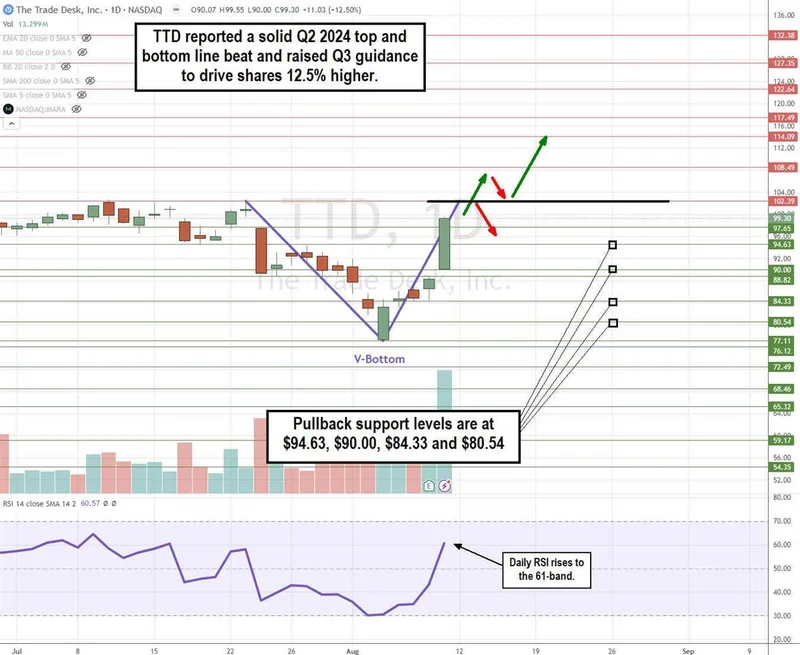It’s easy to look at a stock chart and see a story of failure. The stark, jagged red line of The Trade Desk’s stock, down a dizzying 62% from its peak, practically screams it. You see the headlines about a botched AI platform, slowing growth, and the ever-present shadows of giants like Google and Meta, and the conclusion feels pre-written: the party’s over.
But that’s the wrong story.
When I look at the chaos surrounding the `ttd stock price`, I don’t see an ending. I see a beginning. I see a company in the throes of a painful, necessary, and profoundly important transformation. This isn't just another tech company hitting a rough patch; this is a live-fire stress test for one of the most critical ideas of our digital age: the survival of the open internet. What we’re witnessing isn't the collapse of a business, but the violent, messy birth of its next, and most crucial, chapter.
The Beautiful, Messy Work of Reinvention
Let’s be clear: the last year has been brutal for The Trade Desk. After 33 consecutive quarters of smashing revenue estimates—an absolutely staggering run of consistency—they finally missed. Imagine the silence in that boardroom when the numbers came in. The stock, which once traded at a dizzying P/E ratio over 150, has been humbled, now sitting at a much more terrestrial 65.
Then came Kokai. The company’s ambitious new generative AI platform was meant to be the next great leap forward. Instead, it stumbled out of the gate, alienating a core user base by removing beloved features from its predecessor, Solimar. Now, it's bogged down in litigation. When I first read about the customer backlash, I honestly just sat back in my chair, speechless. It was a classic case of a brilliant team getting so focused on the future that they forgot what people loved about the present.
It’s tempting to pile on. To see this as a sign of a company that has lost its way. But isn't this exactly what real innovation looks like up close? It’s not a clean, linear progression. It’s a series of messy, sometimes painful, experiments. The Trade Desk is trying to build the engine for a completely new kind of advertising ecosystem, one that isn’t controlled by a handful of trillion-dollar behemoths. You don't take on a project of that magnitude without breaking a few things along the way. The question isn’t whether they made a mistake with Kokai—they clearly did. The more important question is, are they learning the right lessons from it?

The David vs. Goliath Battle for the Internet's Soul
To truly understand what’s happening with The Trade Desk, you have to zoom out from the `ttd stock price today` and look at the battlefield. On one side, you have the “walled gardens”—companies like Google and Meta. In simpler terms, these are closed ecosystems where they control the user, the data, and the ad space. It’s a tidy, profitable, and deeply centralized model.
The Trade Desk is fighting for the other side: the wild, sprawling, and beautifully chaotic "open internet." Their entire strategy is a bet against those walls. Their Unified ID 2.0 initiative is a direct challenge to the privacy-eroding tracking cookies that the giants have relied on for decades. It's an attempt to build a new identity framework for the web that is both effective for advertisers and respectful of users.
This is the real game being played here, a fundamental architectural decision about what the next century of digital life looks like—it’s about whether we live in a series of curated corporate theme parks or a truly interconnected global commons, and that’s a fight worth having. It’s a fight that reminds me of the early days of the web, when closed services like AOL and CompuServe seemed invincible, only to be completely eclipsed by the open protocols of the World Wide Web. History doesn't repeat, but it often rhymes.
Watching the `ttd stock news` feels like watching a proxy war for that larger conflict. Of course its stock is more volatile than `google stock` or `amazon stock`; it's a challenger, an insurgent. It’s not playing the same safe, protected game. While its revenue growth has slowed from 27% to 22%, it's still growing at a remarkable clip in a market projected to nearly double to over $1.1 trillion by 2030. Is that the sign of a dying company, or one that’s just catching its breath before the next big push? For some, that potential makes it 1 Growth Stock Down 62% to Buy Right Now.
The company’s challenge is immense. It must convince advertisers, publishers, and consumers that its vision for an open, privacy-conscious internet is not just a noble ideal, but a better business model. It has to do this while simultaneously fixing its own product missteps and fending off the most powerful corporations in human history. It's a high-wire act with no safety net. But what truly world-changing endeavor ever had one?
This Isn't a Stock, It's a Barometer
So, what do we do with this? We can obsess over the daily stock fluctuations, comparing them to the relative calm of `amd stock` or the drama of `tesla stock`. Or we can see the signal in the noise. The Trade Desk's current struggle isn't a story about a failing ad-tech company. It’s a story about the cost of ambition. It's the financial embodiment of a philosophical war for the future of our digital world. The stock’s volatility is a direct reflection of the uncertainty of that war. And for me, that makes it one of the most fascinating, and important, stories in technology today. Its success or failure will tell us more than just the fate of one company; it will be a barometer for the health of the open internet itself.
